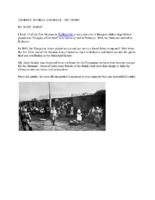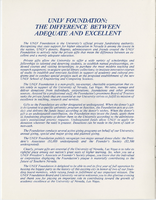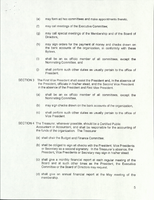Search the Special Collections and Archives Portal
Search Results

Biographical essay by Rudy Horst, 2014
Date
Archival Collection
Description
Rudy Horst was a prisoner at Auschwitz and was part of the Death March from Warso to Kutno, then transported to Dachau. He was liberated from the camp at Muldorf in 1944. He came to the United States in 1948.
Text

Transcript of interview with Glenn Tredwell by Barbara Tabach, March 4, 2016 and April 14, 2016
Date
Archival Collection
Description
In this interview Glenn Tredwell talks about his business ventures since moving to Las Vegas in 1976. He is able to address the many nuances of technology on the global gaming industry.
Text

Program from Christmas with Class at the Thomas and Mack Center, December 16, 1983
Date
Description
This program is from the gala opening of the Thomas and Mack Center at the University of Nevada Las Vegas in 1983, which featured a celebrity lineup including Frank Sinatra, Dean Martin and Diana Ross. The program provides details of the contributions of Jerome Mack and Parry Thomas to the University of Nevada, Las Vegas.
Text

Transcript of interview with Mindy Unger-Wadkins by Barbara Tabach, October 28, 2015
Date
Archival Collection
Description
In this interview, Unger-Wadkins discusses growing up in Las Vegas? close-knit Jewish community in the 1960s and 1970s, and involvement with various Jewish youth organizations and activities. She also describes her career in public relations, reflecting upon the unique challenges faced when interacting with the public, and with politics, in her positions. Unger-Wadkins ends by describing her current work in land development, particularly the history of the Three Kids Mine and the technical and political process of ensuring the land is suitable as a residential area.
Text

Transcript of interview with Laura Sussman and Wendy Kraft by Barbara Tabach, February 17, 2016
Date
Archival Collection
Description
They've been referred to as the two Jewish mothers who own a funeral home. At first glance that seems too simple a description. However, it is how they arrived at this description that tells a story of two women who moved here in the late 1990s and whose paths crossed as they became part of the Jewish community of Las Vegas. Laura Sussman arrived first. It was 1997. The Jewish Community Center, a JCC without walls as Laura puts it, hired her as its first executive director. She was from Ohio where there was a robust Jewish tradition. She was director for eight years; then executive director at Temple Beth Sholom. Wendy Kraft moved to the valley in 1999. She was a stay at home mom from Boston, who was accustom to volunteering in the Jewish community. Knowing no one and on the brink of divorce, the Jewish community became her life, a way to build a network of friends and keep her occupied just as it had been in Boston. The two women met through their work with the JCC and love followed. Several years later, in 2009, so did their new business, Kraft-Sussman Funeral and Cremation services. By February 6, 2015, Laura and Wendy had married. They had already formed a family with each other and their three daughters, Leah Sussman, Emma and Elyse Kraft. In this interview they discuss their joint sense of purpose that includes love of family, dedication to the Jewish community, pride in the LGBT identity, and providing caring services to those at the time of funeral services. They talk also of Jewish traditions related to death, the Jewish burial society known as Chevra Kadisha, and challenges of their industry. They share feelings about nonprofits and how they value being actively involved in the community.
Text

Transcript of interview with Oscar Goodman by Claytee D. White November 10, 2014
Date
Archival Collection
Description
Oscar Baylin Goodman (1939- ) is the former mayor of the city of Las Vegas, Nevada, serving 12 years until 2011, when he swore in his wife of over 50 years, Carolyn Goodman. Oscar Goodman is the official ambassador of Las Vegas, and the chairman of the Las Vegas Convention and Visitors Authority (LVCVA) Host Committee. He is also known as one of the best criminal defense attorneys in the United States, and spent 35 years defending alleged Mob figures such as Meyer Lansky, Frank Rosenthal, and Anthony Spilotro. Goodman is the primary visionary and a member of the board of directors of The Mob Museum in downtown Las Vegas, which opened in 2012. Goodman was born June 26, 1939 in Philadelphia, Pennsylvania. He earned his undergraduate degree from Haverford College in 1961 and his law degree from the University of Pennsylvania Law School in 1964. That same year he moved to Las Vegas and in 1965 he was admitted to the Nevada State Bar. He served as Clark County?s chief deputy public defender from 1966 to 1967. Goodman was elected as mayor of Las Vegas for the first time in 1999. During his three terms (the legal limit), he contributed to the economic and cultural development of the downtown area by supporting projects such as the arts district and Union Park, a high-rise residential and business project he helped to secure 61 acres of land for. He helped to begin what he called the ?Manhattanization? of downtown, which included the construction of taller buildings for better use of the area?s prime real estate. In this interview, Goodman discusses the role of Judaism in his life, from childhood to adulthood to parenting his own four children. He touches on his involvement with Temple Beth Sholom, including serving as its president, as well as in local development projects like the Lou Ruvo Cleveland Clinic Brain Health Center, Smith Center for the Performing Arts, and Mob Museum. In addition, Goodman discusses the impact of Jewish residents on the city and its development, and mentions leaders in the gaming industry, legal profession and in politics.
Text

Transcript of interview with Jackie Boiman by Barbara Tabach, March 27, 2015
Date
Archival Collection
Description
Jackie, n?e Brooks, Boiman was born in Brooklyn and raised in Levittown, New York. Although Jackie recalls her family?s Jewish observance as far less than strict, her religious connection began in the Levittown Jewish Center Sunday School and under the close relationship she had with her grandmother, who kept kosher and inspired her to do so. In her early twenties, Jackie worked in data reduction at Grumman Aerospace Corporation and the space program; was married and had her only child, Andee. After twelve years of marriage, Jackie divorced and relocated to Las Vegas, where her parents had moved earlier. In Las Vegas, job opportunities for a single mother were scant. Then after months of searching, she found her first job as a part time secretary for Temple Beth Sholom. Over the course of the next nearly fifteen years, Jackie would go on to work with almost every congregation and temple in Las Vegas, developing their youth programs and contributing to the growth of each one for 15 years. After a brief retirement, she had gone back to work as the first administration person for Touro University. In this interview, Jackie discusses at length her involvement with each of the temples, her experiences with being a single mother and living below the poverty line. She shares how her life has been changed through trials and tribulations but how her faithfulness and commitment to her mission had led her to the success she has today.
Text

Temple Beth Sholom Master by-laws, February 12, 1998
Date
Archival Collection
Description
This document establishes the purposes and duties of the board of directors and the make up of the membership of Temple Beth Sholom.
Text

Transcript of interview with Rabbi Mel Hecht by Barbara Tabach, March 17, 2016
Date
Archival Collection
Description
In this interview, Hecht talks his life experiences leading him to becoming a rabbi, eventually being a spiritual leader in Las Vegas. He discusses his experiences at Ner Tamid as well as the joy of starting Temple Beth Am, with the support of Morris and Lillian Shenker. Hecht shares stories about working with unions and Ralph Engelstad.
In 1939, Rabbi Mel Hecht was born in Detroit, Michigan. At the age of five, his family moved to Miami, Florida where they had a large, extended Jewish family, complete with relatives who were hazzans and mohels. Soon after moving to Florida, his parents bought a hotel in Hialeah, about 10 miles outside of the city, where Hecht spent the remainder of his childhood. Hecht attended the University of Miami where he earned a Ph.D. in Divinity, and subsequently attended the Hebrew University of Jerusalem. In 1971, he became a rabbi upon graduating from seminary in Cincinnati, Ohio. Three years later, Hecht joined the U.S. Army and served as a race relations officer in Germany. After his service, Hecht returned to Florida (Fort Pierce) to lead his own congregation, and in 1980, he moved to Las Vegas and became the congregational rabbi for Congregation Ner Tamid. Two years later, he left Ner Tamid to start a new congregation?Temple Beth Am?which grew swiftly. In 1982, Hecht also married Michelle (?Micki?). The couple have three children: Melissa Hecht, Karin Toti, and Adam Hecht.
Text

Transcript of interview with Leonard I. Gang and Roberta Gang by Barbara Tabach, September 14, 2016
Date
Archival Collection
Description
Leonard Gang (1935 - ) and Roberta Gang (1940 - ) are both natives of New York, though different boroughs and Jewish traditions. The couple met in 1960 while students at Cornell University and married in 1961. Two years later, Len graduated from New York University School of Law. Leonard had fallen in love with Western United States as boy on a family vacation. So when a notice was posted for a law clerk with the Supreme Court of Nevada, he knew he wanted to apply. When he presented Bobbie with a choice of Alaska or Nevada, she flatly responded that Nevada was as far west as she was willing to move. Thus, began their long and influential residencies in both Carson City and Las Vegas. In Las Vegas, Temple Beth Sholom was quickly a welcoming place to be for the Gang family. While Leonard?s law career flourished, Bobbie realized her energy and commitment to become an advocate for the benefit of the vulnerable. Over the years, she actively participated in the political campaigns of others and even entered the political arena herself, which she discusses in this oral history. During Leonard?s successful legal career, he held positions as Deputy District Attorney and Deputy Public Defender in Clark County and was in private practice. From 1971 ? 1974, he was District Court Judge in Clark County before returning fulltime to private practice. By 1988, Bobbie and Leonard had become forceful lobbyists including representing Nevada Women?s Lobby among others. In 2012, Bobbie received the Virginia Cain Progressive Award from the Washoe County Democratic Party for her leadership and dedication to the rights of others. In this oral history, the Gangs highlight their tireless efforts, the long list of political and civic leaders that they worked alongside of, some of Leonard?s high profile cases, and their Jewish heritage. They are parents of three: Lynne Moore, Karen Schnog, and Joshua Gang.
Text
